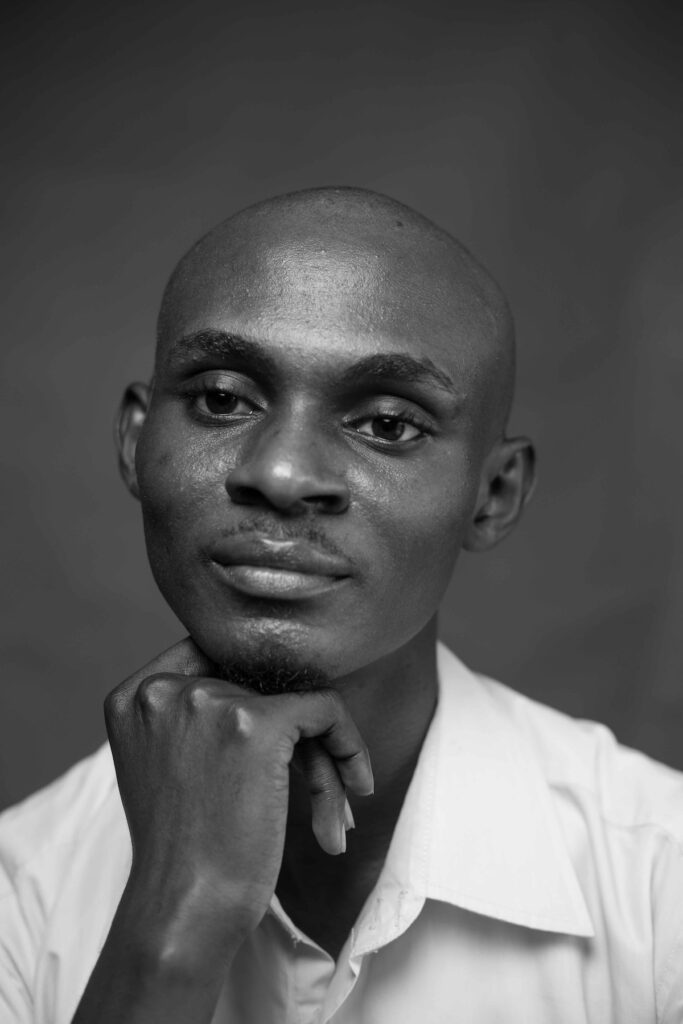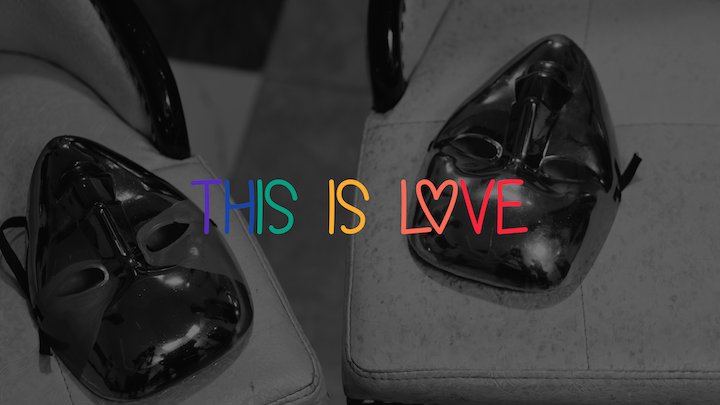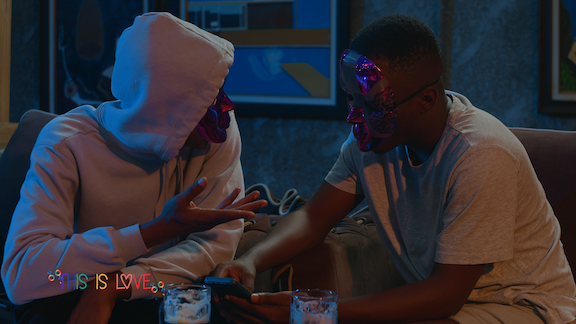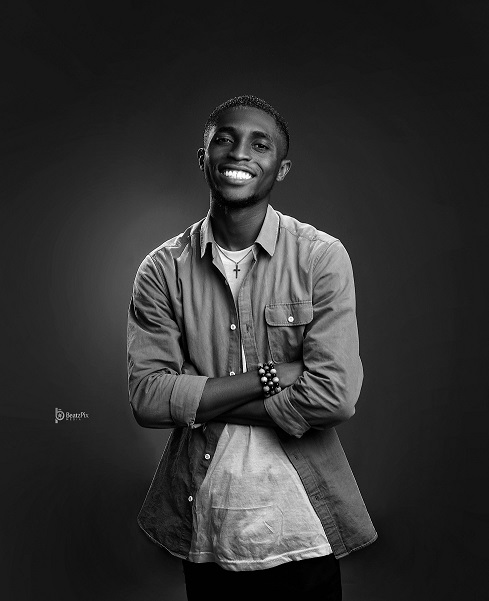A café encounter with a Nigerian British gay man taught Victor Ugoo how much of a hold family expectations had on queer people regardless of age, and how much of an influence culture was regardless of location. The man had been married for years, but he and his partner were hiding it from their parents. Their secret was a constant source of frustration and fear. Listening to him, Njoku thought about similar relationships he knew of in his country home, Nigeria, members of the LGBTQ+ community who were married and suffering in secret. His reflection led him to make his new documentary This Is Love.
The stories of This Is Love focus on three queer couples living in Nigeria, who share their love lives and challenges navigating a country with anti-LGBTQ laws. One of them, Jeffery, is, like the Nigerian British man, burdened with the possibility of his family discovering his sexuality and his relationship with CJ. The second pair, Maya and Silva, renew their commitment daily. For Ijeoma and Emmanuella, the key is a shared understanding even in a space full of hurt and hate. The documentary received Best LGBT Feature at the Bahia Independent Cinema Festival in Brazil and will be screening at the Replay International Film Festival in Austria.
“I wanted a story that the average LGBTQ+ person in Nigeria could relate to, that could make them feel seen and heard and potentially cause the average Nigerian to reflect on their bias,” Ugoo told me. “A tall order.”
He was also new to the industry. He was a line producer and subtitle supervisor on the Netflix hit Yahoo+ and a production consultant and subtitle editor on ỤNỌ. But working on This Is Love, he faced challenges familiar to every filmmaker exploring queer experiences, including Ima’mi producer Godwin Harrison and Country Love director Wapah Ezeigwe. Brands and organizations, despite initial commitments, were hesitant to invest in a project that could tarnish their reputation and yield little profit.
In the interview below, Ugoo takes us through the production.

This Is Love is such a fine film. I enjoyed watching every bit of it. How did you approach the storytelling to ensure authenticity and sensitivity? How did you establish rapport with the couples?
I don’t think that I did anything out of the ordinary. I consider myself a sensitive person and it shows in everything I do. People always make it seem like being sensitive is a bad thing. I do not agree, as the world would be a better place if we were all more sensitive to our feelings and other people’s feelings. I also think filmmakers and storytellers should be sensitive as people and should approach stories with some sensitivity.
That said, I understand the story is sensitive, especially given the SSMPA [Same-Sex Marriage Prohibition Act] and how conservative Nigerians can be. Outside of it being an LGBTQ+ story, it is a love story. Love is sensitive. It is risky. When you love someone, there’s no guarantee that the person will love you back. And if they love you back, there’s a chance that they might not love you in the exact way that you wish for them to love you. And even if they did love you that way, things change.
So I knew that the cast members were coming to share a vulnerable part of themselves just by sharing a love story. And the vulnerability is heightened by the fact that they live beautiful love stories in a place where the love they share is taboo. I believe that understanding what is at stake for the cast helped.
When I started working on the story idea, I noted that the story is not more important than the safety of the cast. As someone who grew up effeminate in Nigeria, I’m aware of the implications of being gay in Nigeria. I always joke that being effeminate makes one the poster child of the LGBTQ+ community. An effeminate person gets labelled. People make assumptions of the effeminate person’s sexuality and then treat the effeminate person with the hostility reserved for gay people. I know the consequences.
I won’t pretend I fully understand how it feels to be in front of a camera and share vulnerable parts of oneself. But I know that sharing that could endanger them, result in them losing their livelihood, and the security and safety that comes with being in the closet as an LGBTQ+ person in Nigeria and possibly more. With that knowledge, it was imperative to consider how to make the cast feel safe and comfortable enough to be a part of this documentary and ensure that they don’t put themselves in harm’s way or lose any parts of their lives. So we introduced masks, granted them the option of choosing fake names, distorted their voices.
I explained what we were trying to achieve and asked what felt comfortable to them. Each person made their input. I should mention that we also spoke to each cast member separately to ensure total anonymity is achieved. We considered shooting at their houses, as we believed they would feel safer there. But their houses could make them identifiable. One couple said it would make them uncomfortable to have many people in their space. We decided against that. But to make the place feel familiar, we tried to set up our location to replicate their living spaces.
We made every crew member sign an NDA. The cast members were aware of this. They signed contracts themselves. I also had a one-day conversation with crew members about proper conduct on set. We talked about the need to use each person’s gender correctly and to especially refrain from any remarks that would make anyone feel some type of way about their sexuality. We needed them to trust us. So from the beginning, we shared with them everything we planned. Changes in plans were communicated in a way that allowed the cast members to give feedback. So we have three couples, six people, who trusted us. It makes sense that these people would be honest, and that would reflect in the film.

There are intermittent cuts between the subjects and floral footages, especially during the narration. What is the significance of this visual motif and the reasoning behind the chosen flower species?
[Laughter]. My dear, na condition make crayfish bend. I would like to tell you that the decision was borne of an unending depth of creativity or all those nice, cute things that creative people say, but that would be a big fat lie.
After production, we realized we didn’t get enough B-roll footage, and we couldn’t afford to reshoot. It would also be asking too much from the cast. So we had to make something else work. That’s how we landed on the visual motif. Of course, we used flowers because of the theme of love. We made it black-and-white, so it doesn’t distract from the story. We used it during narration as it meshes with the soothing voice of the narrator.
When I consider things that didn’t work for the film, that’s the first. Rookie mistake to not have gotten enough footage. I’m grateful for the brilliant people I worked with for helping to figure it out.
There is one couple without masks. Whenever actors are exposed to acting LGBTQ+ movies in Nigeria, I worry a lot about their safety. Additionally, the depiction of illegal substance use raises concerns.
I’m crippled with fear for the safety of the cast and crew. The film editor had to remind me that nothing is under my control, especially once the film is released. The crew members understood the weight of the film, and, as they wanted, some were unnamed in the end credits. Others used different names. Only a few used their real names. We have had a few LGBTQ–themed films in Nigeria and I don’t think any danger came to their crews. I hope it is the same with This Is Love.
The unmasked couple made the decision. I think it adds layers to the conversation and the film. I trust their decision and hope that I’m only overthinking things.
A key concern was raised in the film: the government and anti-LGBTQ+ laws. What challenges did those issues pose?
The film would have been entirely different if we weren’t concerned about anti-LGBTQ+ laws. We thought about incorporating their friends and loved ones. But that won’t give the cast anonymity. And we would have needed to give NDAs to those family and friends — a logistics nightmare, possible legal issues, social implications. And that’s us presuming that these people have friends and family who might be comfortable being a part of this story.
We also considered outdoor shoots that show the cast in everyday activities. They were open to it. But shooting in public in Lagos is already a challenge; imagine what would have happened if we had people in masks on the streets, and these are same-sex couples. We couldn’t afford that.
I like to think that the film would have been better if we incorporated their family and friends, or had the couples shopping together and doing stuff on the streets that heterosexual couples would. Unfortunately, we had to limit ourselves from the start to ensure that everyone in the project was safe. Besides, if anti-LGBTQ+ laws didn’t exist, we possibly won’t have this film in the first place as the terrain would have been different.
Another issue raised in the film is the role of religion in queerness. In what ways do traditional values and religion intersect with LGBTQ+ identity in Nigeria?
I dinor do master’s o. Ah! Where to begin? I don’t know if you noticed, but the questions the cast answered were questions that LGBTQ+ people typically ask each other on first dates or first meets. Religion is usually a big part of these conversations. A lot of LGBTQ+ people have experiences with religion that force them to reconsider their faith or enter what I call a religious limbo. In the film, Jeffrey mentions pastors screaming, It’s not Adam and Steve, it’s Adam and Eve! So in the voice of a sage, Sophia Petrillo [from The Golden Girls]: Picture this: Lagos, 2024, a lesbian usher who has a date planned with her girlfriend on a Sunday afternoon hears that from her pastor less than two hours before the date.
Some people would argue that one can’t subscribe to any religion and still be a member of the LGBTQ+ community, given that a lot of religious groups consider same-sex sexual relations to be a sin. I say that people should do what they want or what brings them peace. And if subscribing to organized religion is that, why not? I can’t suggest that religious books should be rewritten to allow for same-sex relations. However, I’m confident that these religious books didn’t also say to jail people for 14 years for falling in love and asking to be loved.
And I’m sure that if religious groups, considering their influence, pushed back against that law, it wouldn’t have existed in the first place. But that couldn’t have happened, given that religious groups sow seeds of homophobia, which a lot of LGBTQ+ people, unfortunately, must contend with in the form of internalized homophobia their whole lives. Quite tragic.
It behooves everyone to find what works for them. Anyone who can pull off keeping to their faith despite the dash of homophobia here and there should do that, but not without questioning the need to belong to a group that makes them feel less than. And anyone comfortable doing life without holding onto God should please go for it but should also be honest about their reason. And then give yourself grace: if your view on religion changes, it’s not the worst of things, embrace the change.

How do you intend to make this documentary accessible to the people you have made it for, queer or not? Film laws would consider them “inappropriate.”
Thank you very much for that question. I would have inserted a crying emoji or a meme, if this were to be a text. Distribution seems to be the hardest part of filmmaking. We are still trying to work that out. In the meantime, we are focusing on festivals. We received Best LGBT Feature at the Bahia Independent Cinema Festival in Brazil and will be going to the Replay International Film Festival in Austria. Hopefully, there will be more. Once we know for sure how to make the film available to Nigerians, we will also announce that.
Anyone can easily tell that the project is a product of love. But, of course, money made it work. What was funding like?
I mostly funded the film. The other executive producer contributed about a third of the budget. Being a broke student — I was finishing my first master’s when production started — every bank transfer had my heart doing gbim-gbim-gbim. One 40,000 here, 100,000 there. We had to make payments to crew members in only small installments. Then the bill was in the millions and I considered calling everything off. Fear of embarrassment is why we have a complete film. I haven’t been able to save more money. Shey you will contribute if I open GoFundMe? Please help the less privileged! Help a starving artiste! Tainz and Gobless!
One cast member, CJ, shares his kito experience. Many queer Nigerians have had their own experience of this. I don’t think one can ever be careful enough. For a naive queer reader of this interview: quick tips on what to do to avoid this ugly situation, and what to do when you find yourself in it?
I dinor know o. As you mentioned, one can’t be careful enough. But Kito Diaries exists. I believe they have done a good job documenting areas to be mindful of across several parts of Nigeria. They also have a registry of sorts, of people who have been accused of being kito. That is not enough, especially as they don’t seem to have been active in the last year. But that doesn’t diminish the work they have done. I wish they had something that is easier to navigate. It can’t be easy to comb their entire website looking to find if a potential partner is kito. But naive queer people should know that such a platform exists. They also have real-life and fictitious kito stories.
I will also suggest that people learn to trust their instincts. If it feels like it could be kito, it probably is. As much as possible, meet potential partners in public first and only visit their home when you feel comfortable. I hate saying this, as people have also been kito-ed by people they trust.
It all removes the possibility of having NSA quick sex encounters, but safety first, right? It’s safest to meet people within your own circle, as someone you know probably knows them. But it limits one’s pool and takes away the opportunity to build new connections and widen one’s network. Send the contact of the people you plan to meet to close friends and family. It won’t exactly save you, but you might be able to track them after the fact. Avoid empty social media accounts. If the account looks like it’s owned by a Yahoo Boy or used to run scams, that could be kito.
Every suggestion has a limitation. Nobody deserves to be that security-conscious while trying to get laid or find love. And one could do everything right and still fall victim. That’s the sad reality of dating as a member of the LGBTQ+ community in Nigeria. There’s nothing more to say. ♦
If you enjoyed what you just read, consider making a PayPal donation to enable us to publish more like it.
No One Covers Nollywood Like Open Country Mag
— A Small Indie Producer Bets on Social Justice Cinema
— Rita Dominic‘s Visions of Character
— The Epic, Transformative Comeback of Chidi Mokeme
— How Dakore Egbuson and Tony Okungbowa Traverse Trauma in YE!
— With the S16 Film Festival, an Arthouse Collective Locks Its Focus
— How Tolu Obanro, Nollywood’s Top Composer, Crafts the Sounds of Its Biggest Hits
— The 10 Best Films & TV Series of the Year
— The 10 Best Acting Performances of the Year
— A Tribe Called Judah, Reviewed: A Box Office-Breaking Heist of Authenticity & Heart
— How Mami Wata Swam to Sundance
— Writing Omo Ghetto: The Saga, Nollywood’s Highest Grossing Film of All-Time
— How Yahoo+ Captured a Desperate Side of Internet Fraud
— Awaiting Trial: Families of SARS Victims Speak in Devastating Documentary
— Country Love Depicts Tenderness in LGBTQ Lives





